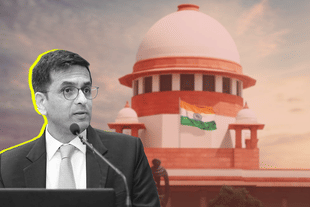Politics
Inside The Supreme Court's New 'Woke-Abulary'
R Jagannathan
Aug 22, 2023, 12:48 PM | Updated 12:48 PM IST
Save & read from anywhere!
Bookmark stories for easy access on any device or the Swarajya app.


The Chief Justice of India, D Y Chandrachud, has put out a handbook for judges and the legal fraternity in order to avoid the use of gender stereotypes in their work.
Titled Handbook on Combating Gender Stereotypes, the publication may be useful in preventing the use of pejorative terms against women in legal cases, both by lawyers and persons sitting on the bench.
However, out of the 43 words and phrases given as examples, almost all refer to terms used to describe women. This means the handbook largely focuses on the stereotypes inflicted on women, not men as much. It lacks balance.
There is am implicit assumption that men cannot be stereotyped, or that it does not matter much since they anyway wield the levers of power.
But let us begin with what one can easily agree with. Using terms like prostitute, harlot, hooker, whore and slut to describe any woman can clearly be prejudicial to them. In most such cases, as the handbook suggests, sex worker would work just as well. We agree forcefully.
But where the handbook goes woke is in trying to reduce all adjectives used to describe particular women or their vocations as stereotypical.
For example, it wants the term “career woman” to be replaced with just “woman”, or even the description of a woman as Indian or western as simply woman. Is calling someone an Indian woman pejorative?
The handbook also wants to refer to birth gender, which is the basis of the bulk of our demographic data, as “assigned female, male at birth”.
In other words, it wants to make the gender issue tentative right from the beginning.
Of course, this is in keeping with the Chief Justice’s own view, that there is no absolute concept of man or woman, and that gender is fluid.
While it is certainly true that we are all androgynous in nature, with a combination of male and female traits in varying proportions, the fluidity is not so great that one cannot make out the difference, whether at birth or much later, for the vast majority of people.
The idea that gender is something chosen is a woke liberal view.
In the Indian consciousness, despite variations in sexual preferences and self-identification, androgyny is (arguably) best captured in the term ardhanareeswara, which is Shiva and Parvati together in one body, represented as half-male-half-female.
Despite our culture’s acceptance of variations in sexual preferences, and the essential androgynous nature of all humans, the average Indian does not assume that gender itself is undeterminable and arbitrary.
The Supreme Court, it appears, is being guided more by woke western ideas, and not by an Indian cultural vision.
Some of the word replacements given in the handbook are quirky and even laughable.
For example, it wants to replace the word “affair” — which is gender neutral anyway — with a phrase, a “relationship outside of marriage”.
Instead of describing a behaviour pattern as “ladylike”, which need be seen as pejorative, the handbook suggests that it be replaced with a gender neutral term like “amusing” or “assertive”. That’s surely amusing.
It has also proscribed phrases like “bread-winner” or “provider”, and instead wants to use the term “earning” member or “employed”. And “sex change” should be indicated as “gender transition” or “sex reassignment” — implying that gender is decided by human design.
An “unwed mother” can only be described as “mother”. Luckily it does not get into describing unmarried men who may be fathers as just “father”, for who can know without a DNA test?
The good changes include referring to rape as just rape, needing no additional word like “forced rape”, or describing a rape victim as either survivor or victim.
While one cannot guard enough against stereotyping, the Supreme Court handbook needlessly makes even gender neutral and harmless words un-kosher.
The court’s new woke-abulary, which has all the blessings of our chief justice (is he woke?), suggests that the courts are now going to move towards politically correct terminology. Some of it is good, but when the highest court starts influencing everyday language, one must wonder whether its primary purpose is justice, or more of virtue-signalling.
Jagannathan is former Editorial Director, Swarajya. He tweets at @TheJaggi.




